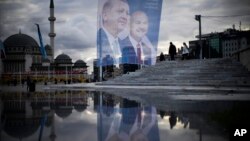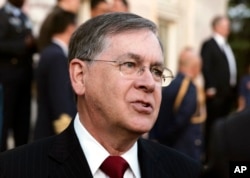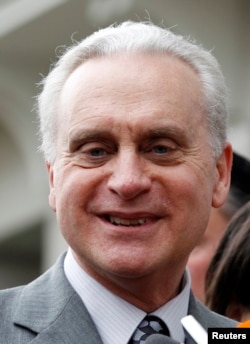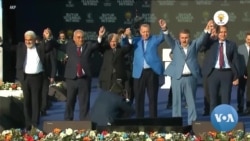As Turkey heads to the polls for its momentous elections Sunday, former U.S. ambassadors to Ankara will be monitoring from afar.
While the perspectives shaped by their respective tenures in Turkey may vary, three former mission chiefs speaking to VOA share at least one view: The elections in which President Recep Tayyip Erdogan will face the biggest challenge to his two-decade rule will determine the course of Turkey’s future, its role as a NATO ally and its international standing.
Turkey’s elections are taking place amid an economy battered by inflation and a currency that has depreciated, much of which has been blamed on the current government’s policies as well as its failure to help people recover from devastating earthquakes earlier this year.
Erdogan has focused his campaign on quake reconstruction, the defense sector and spending measures, including raising the minimum wage and pensions, providing help for electricity and natural gas, and allowing some to take early retirement.
Ambassador James Jeffrey, who served in Ankara from 2008 to 2010, thinks Turkish people will be casting their votes based on three things: economic policies, earthquake response and criticisms of authoritarianism.
Turkey’s six-party opposition alliance is running on a promise to do away with the executive presidential system, established through a close mandate. The opposition, which says that mandate consolidated one-man rule, vows a return to the parliamentary system.
According to Jeffrey, the elections are the “first real referendum” on the presidential system. “This is the first chance for the Turkish public to decide whether they like this model or not,” he told VOA.
Democracy, media freedom concerns
David Satterfield, who served as U.S. ambassador to Turkey from 2019 to 2022, believes Turks deserve to live in a flourishing democracy.
The U.S. government has expressed its concerns on several occasions with regard to democratic backsliding, including but not limited to what it describes as wrongful imprisonment of some political figures in Turkey.
Speaking to VOA via Zoom last week, Satterfield praised the level of political enthusiasm in Turkey. He believes the elections will produce an outcome that “genuinely reflects the views of the Turkish people.”
Despite criticism that Erdogan’s tenure has been marked by an authoritarian approach to politics, U.S. Ambassador Francis Ricciardone, who served from 2011 to 2014, says Turkey remains substantially democratic.
In February 2011, shortly after expressing concern about increasing press restrictions and diminishing freedom of expression, Ricciardone’s criticism drew an angry response from government officials, including then-Prime Minister Erdogan, who called him a “rookie” ambassador.
In an interview with VOA on World Press Freedom Day, Ricciardone spoke about his dismay at what he saw as deteriorating media diversity and freedom in Turkey.
“There was still a multiplicity of voices that could be heard, whether in print and broadcast media or in what was then still relatively early days on social media, with a lively conversation among different political perspectives,” he said.
Jeffrey said the reports the State Department does every year on the lack of checks and balances, along with ongoing press restrictions, should be taken seriously.
“Turks are well-educated and will make a considered decision on which way they want their country to go,” he said during a Skype interview. “I think that in the end, that will be reflected on whatever government we have.”
Human Rights Watch issued fresh warnings Wednesday that the government has accelerated efforts to tighten control over social media and independent news sites ahead of the high-stakes election, saying “the vote will test whether Turkish voters can rely on social media for independent news.”
Heat of elections or serious concern?
Asked about Turkish Interior Minister Suleyman Soylu’s comment describing the upcoming elections as a “Western coup plot,” Ricciardone said that even though such talk cannot be dismissed as political rhetoric, politicians resort to such statements in the heat of elections.
“I put it in that kind of context of trying to raise the political support by rallying against the foreigner or as a way of blaming others for things that make the electorate unhappy,” he told VOA.
Turkish voters still seem to have confidence in the electoral bodies of the state, he added. “I believe the state still has structures of governance that are strong enough to comply with the will of the Turkish people.”
Jeffrey appears to be on the same page. Underscoring the commitment of Turkish people to democracy, he said he expected they would demand a fair, democratic outcome.
But he also said he found Soylu’s comments concerning. “I have never heard anything accurate about my country from him. But fortunately he is not in charge of U.S.-Turkish relations,” Jeffrey said.
Implications for foreign policy
The election outcome could open up more opportunities for Washington and Ankara to directly talk, if not immediately reset relations.
Turkey’s S-400 defense system purchase from Russia triggered U.S. sanctions and Ankara’s removal from the F-35 fighter jet program. The opposition has signaled its intent to address the issue.
Ricciardone said the opposition’s plan to look into this issue was a “good intention that the United States can work with.”
A possible deal in response to Turkey’s request to buy new F-16 jets and modernization kits from the U.S. is still uncertain because of opposition in Congress, which needs to approve any proposed weapons sale to a foreign country.
Former diplomats do not expect to see any lessening of friction over the U.S.-backed Syrian Democratic Forces (SDF), which Turkey sees as the Syrian offshoot of the Kurdistan Workers' Party, or PKK, which Ankara has designated as a terrorist organization.
Jeffrey, who also served as the special representative for Syria engagement until 2020, said Washington and Ankara had managed to avoid a real crisis, although they came close to one in 2019, when Turkish troops entered Syria to fight Islamic State rebels but also targeted Kuridsh SDF forces allied with U.S. forces in the region.
“SDF is still there and Turkey is still unhappy about this,” he told VOA. “But the basic positions have still been held almost four years later.”










